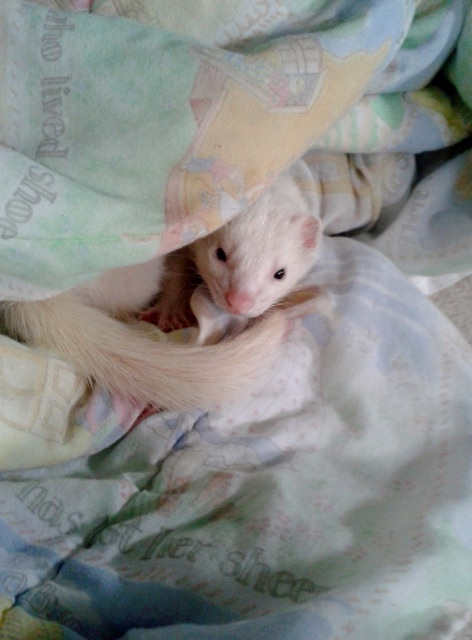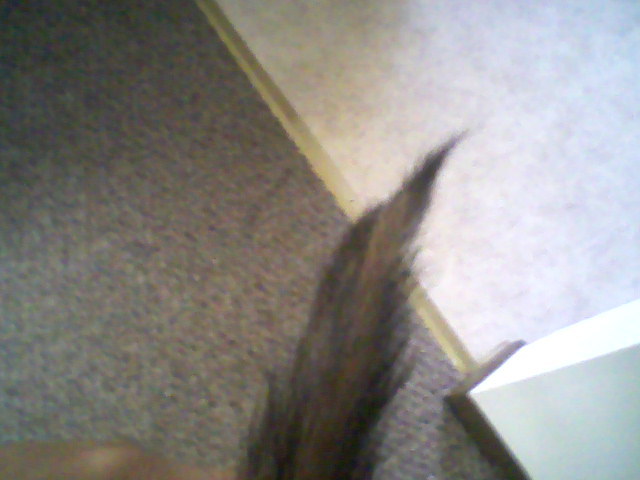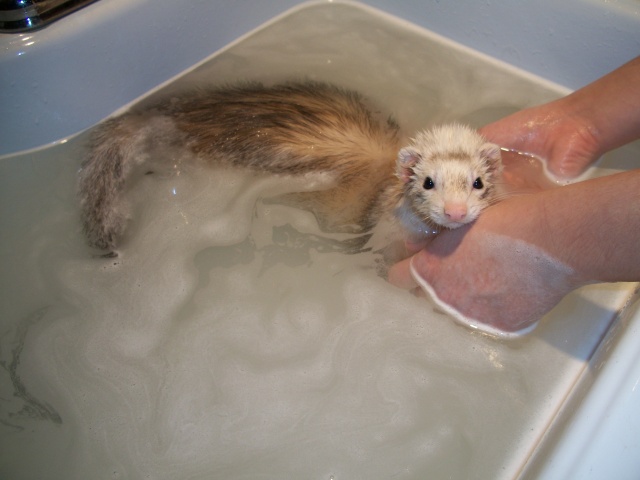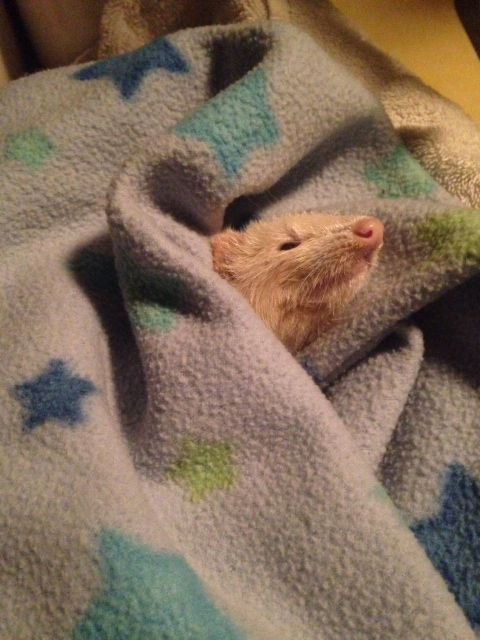QuestionHello, I am considering a ferret as a pet but was wondering if they are prone to any health problems?
AnswerHello, ferrets can have health problems but its just like a dog or a cat. They will need a yearly vaccine for rabies and a distemper vaccine. Below is a list of prone health problems:
Body Odor - mature, unaltered ferrets produce a oily skin secretion that produces a very strong odor. The odor is under the control of sex hormones, so spaying/neutering largely eliminates the odor.
Also odor is associated with the peri-anal sac, but will not be noticed unless the ferret becomes extremely frightened and sprays. If they spray, the odor lasts only briefly and quickly dissipates (not like a skunk). Professionally bred ferrets arrive "descented" with these peri-anal sacs removed. There is debate whether this surgical procedure is necessary; it is possible to have post-op complications and even have remnants of the sac missed. Owners purchasing a ferret yet to be "descented" may opt to not have the surgery unless their ferret becomes a sprayer.
Finally, ferrets have glands near the ear/neck area and they will occasionally rub from their ears forward down the face in a adorable "face washing" motions to spread their ear scent. Ear cleaning keeps this to a minimum and many owners simply come to enjoy the mild ferret scent of their ears.
Fatal Anemia in Females - when unaltered females go into the heat cycle, they will remain in that cycle until bred or brought out with a hormone injection (one time only). During this heat period, levels of estrogen are very high and have a damaging effect on the bone marrow. Prolonged high levels stop production of clotting factors which lead to internal hemorrhage and death. This irreversible process is preventable by having the female spay before first heat at approximately age 6 months. If the ferret comes into heat prior to surgery, she can be safely operated on if done early .
Heartworms - ferrets are susceptible and IVERMECTIN can be given once a month from April to October without side effects if your ferret is outdoors frequently or exposed to mosquitoes. A heartworm test is not necessary, but a physical exam is recommended prior to starting the medication each spring.
Colds and Flu - ferrets are highly susceptible to human respiratory infections, both bacterial and viral. They develop the same symptoms, i.e., runny nose, watery eyes, sneezing, cough, loss of appetite. Generally there is no need for treatment, just loving care and lots of rest for 5-7 days. However, if your ferret completely loses it's appetite, develops green/yellow eye or nose discharge or becomes depressed/lethargic, then promptly call your vet. Some viral flu infections may require supportive care or a secondary bacterial infection may develop requiring antibiotics. have been known to ingest include latex toys, cotton balls, bones, toweling, foam rubber, insoles. The symptoms of foreign
Foreign Bodies In G.I. Tract - ferrets are prone to eating rubber or plastics, or ingesting other items such as soft plastic, cotton balls, bones, towels, foam rubber. The symptoms of foreign body lodged in the G.I. tract are varied, depending on where in the tract the material is lodge (stomach, upper or lower tract). Some symptoms might be gradual wasting from loss of appetite, extreme lethargy, gagging, vomiting (rare, so something is seriously wrong if a ferret vomits), persistent dark tarry stools or no stools, or emitting painful cries when trying to poop. If you suspect obstruction, promptly take your ferret to your vet. This is a medical emergency!
Gastrointestinal diseases - ferrets may experience some form of inflammatory or infectious bowel problems during their lives. The symptoms are diarrhea, loss of appetite, nausea, vomiting, lethargy. Your ferret will become deathly ill quickly and prompt vet attention is necessary to provide supportive care, fluids and medications. Once damage has been done to the intestinal lining, the ferret may experience occasionally G.I. upsets throughout it's life. Carafate oral solution, a prescription medication with a 1-year shelf life, may be kept on hand to dose for a few days when upsets occur; consult your vet.
Geriatric Diseases - unfortunately the average life span of the ferret is only 6-8 years. Starting at age 3, there is a marked increase in a variety of diseases of which owners need to be aware and recognize symptoms. Cancer, pancreas tumors, and adrenal gland disease are common and each has their own symptoms, prognosis and treatment
thanks, and glad i could help!
Desiree

 My ferret, Cloud
QuestionQUESTION: I used to have 2 ferrets who were ver
My ferret, Cloud
QuestionQUESTION: I used to have 2 ferrets who were ver
 balding tail
QuestionQUESTION: The ferret I am talking about is one
balding tail
QuestionQUESTION: The ferret I am talking about is one
 Just some basic help questions
Question
Benny!
Hi!
My ferret Benito (we just call him
Just some basic help questions
Question
Benny!
Hi!
My ferret Benito (we just call him
 Elderly ferret
Question
Booger
Hi,
I rescued an older ferret named Bo
Elderly ferret
Question
Booger
Hi,
I rescued an older ferret named Bo
 My ferrets die
Question
Mia
My ferret die lest nite she was ten
My ferrets die
Question
Mia
My ferret die lest nite she was ten